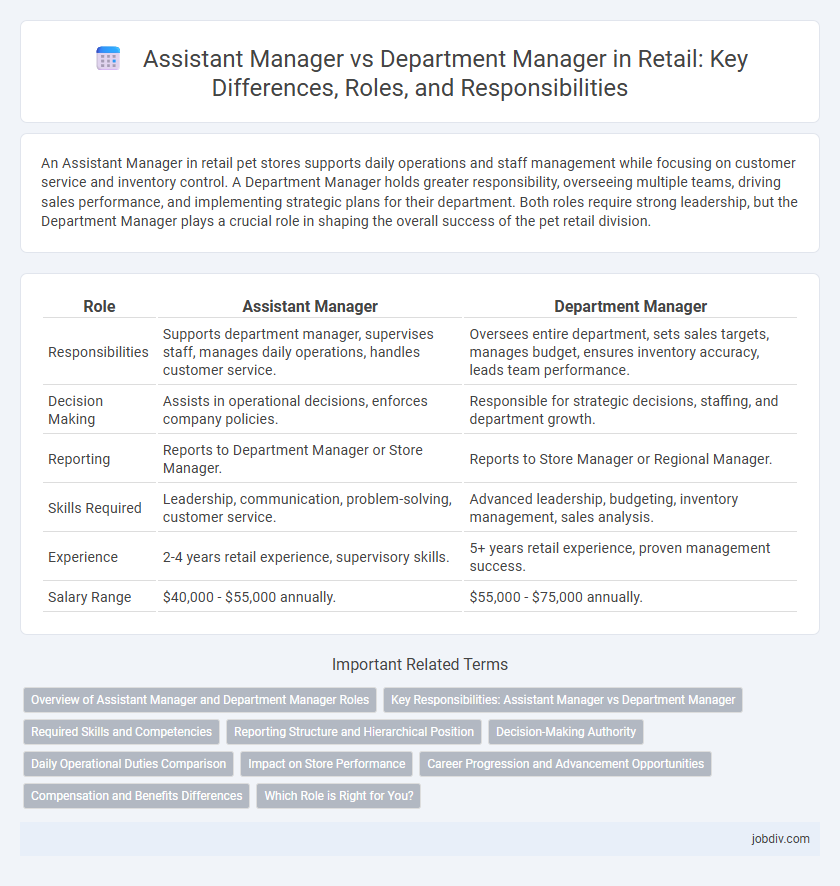An Assistant Manager in retail pet stores supports daily operations and staff management while focusing on customer service and inventory control. A Department Manager holds greater responsibility, overseeing multiple teams, driving sales performance, and implementing strategic plans for their department. Both roles require strong leadership, but the Department Manager plays a crucial role in shaping the overall success of the pet retail division.
Table of Comparison
| Role | Assistant Manager | Department Manager |
|---|---|---|
| Responsibilities | Supports department manager, supervises staff, manages daily operations, handles customer service. | Oversees entire department, sets sales targets, manages budget, ensures inventory accuracy, leads team performance. |
| Decision Making | Assists in operational decisions, enforces company policies. | Responsible for strategic decisions, staffing, and department growth. |
| Reporting | Reports to Department Manager or Store Manager. | Reports to Store Manager or Regional Manager. |
| Skills Required | Leadership, communication, problem-solving, customer service. | Advanced leadership, budgeting, inventory management, sales analysis. |
| Experience | 2-4 years retail experience, supervisory skills. | 5+ years retail experience, proven management success. |
| Salary Range | $40,000 - $55,000 annually. | $55,000 - $75,000 annually. |
Overview of Assistant Manager and Department Manager Roles
Assistant Managers in retail oversee daily store operations, support staff management, and ensure customer satisfaction by handling tasks delegated by the Department Manager. Department Managers hold responsibility for overall department performance, including inventory control, sales targets, and strategic planning. Both roles require leadership skills, with the Assistant Manager focusing on operational support and the Department Manager on achieving business objectives.
Key Responsibilities: Assistant Manager vs Department Manager
Assistant Managers in retail oversee daily store operations, staff scheduling, and customer service to support store performance. Department Managers focus on managing specific product categories, inventory control, merchandising strategies, and team leadership within their department. Both roles require effective communication, problem-solving, and leadership skills, but Department Managers have more specialized responsibilities related to sales targets and product management.
Required Skills and Competencies
Assistant Managers in retail must possess strong organizational abilities, customer service expertise, and team coordination skills to support daily operations and staff management. Department Managers require advanced leadership competencies, strategic planning skills, and in-depth product knowledge to oversee departmental performance and drive sales growth. Both roles demand proficiency in inventory management, conflict resolution, and effective communication to ensure smooth retail operations.
Reporting Structure and Hierarchical Position
The Assistant Manager in retail typically reports directly to the Department Manager, supporting daily operations and staff supervision within specific sections. The Department Manager holds a higher hierarchical position, overseeing multiple teams and reporting to senior management or store leadership. This structure ensures clear communication channels and delegation of responsibilities, optimizing operational efficiency.
Decision-Making Authority
Assistant Managers in retail typically have limited decision-making authority, focusing on supporting daily operations and implementing policies set by higher management. Department Managers possess greater autonomy, making key decisions regarding inventory management, staff scheduling, and sales strategies to drive departmental performance. Their enhanced authority directly impacts operational efficiency and customer satisfaction within their specific retail segment.
Daily Operational Duties Comparison
An Assistant Manager in retail supports the Department Manager by overseeing daily floor activities, managing staff schedules, and ensuring customer service standards are met. The Department Manager holds broader responsibilities, including inventory management, budgeting, performance evaluations, and strategizing sales goals for the entire department. Both roles require collaboration, but the Department Manager carries greater accountability for overall operational success and team leadership.
Impact on Store Performance
Assistant Managers support daily operations, contributing directly to task execution and staff coordination, which enhances overall efficiency and customer satisfaction. Department Managers lead specific departments, driving sales strategies, inventory management, and team performance to increase departmental revenue and profit margins. The collaborative impact of both roles significantly boosts store performance by balancing operational support and strategic leadership.
Career Progression and Advancement Opportunities
Assistant Managers in retail typically focus on operational support and team supervision, gaining essential leadership skills that prepare them for higher responsibilities. Department Managers oversee full department performance, including sales targets, inventory management, and staff development, positioning themselves for senior management or multi-store roles. Career progression often follows a path from Assistant Manager to Department Manager, offering increased decision-making authority and strategic involvement in business growth.
Compensation and Benefits Differences
Assistant Managers in retail typically earn a lower base salary compared to Department Managers, reflecting their more limited scope of responsibilities and decision-making authority. Department Managers often receive higher bonuses and incentive pay tied to store or departmental performance, enhancing their total compensation package. Benefits for Department Managers are usually more comprehensive, including greater healthcare options, retirement contributions, and additional paid time off, reflecting their senior role and increased accountability.
Which Role is Right for You?
Choosing between an Assistant Manager and a Department Manager in retail depends on your leadership experience and career goals. Assistant Managers typically support daily operations, focusing on team coordination and problem-solving, making it ideal for those developing management skills. Department Managers hold full responsibility for sales targets, staff performance, and inventory management, suited for individuals ready to lead independently and drive departmental success.
Assistant Manager vs Department Manager Infographic

 jobdiv.com
jobdiv.com